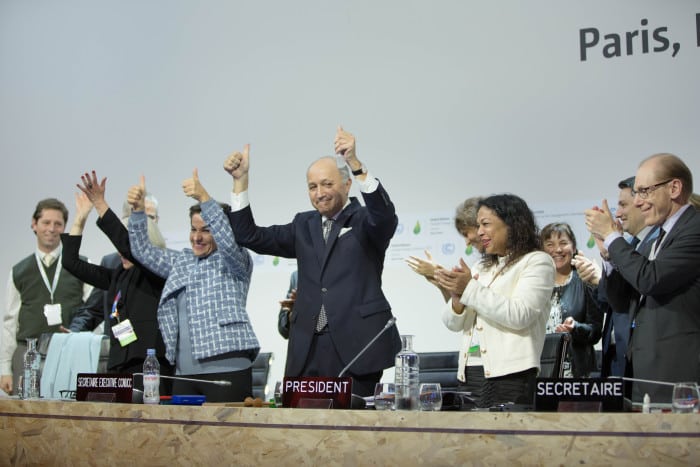
The United Nations is extremely confident that the Paris Agreement on Climate Change will take effect by the end of the year, David Nabarro, a special sustainability adviser to U.N. Secretary General Ban Ki-moon, said during a press conference at U.N. headquarters in New York Thursday. “We’re absolutely certain that we will have the Paris Agreement on climate change entering into force by the end of 2016,” Nabarro said.
The Paris Agreement, which establishes a legal framework under which nations will pursue nationally determined climate mitigation goals, will enter into force 30 days after being formally joined by 55 nations representing at least 55 percent of global emissions. To date, 27 nations representing 39.08 percent of global emissions have taken that step.
At least 20 more nations will join the agreement on Sept. 21 during a special event hosted by Ban at U.N. headquarters in New York, Selwin Hart, director of the secretary general’s climate change support team, said during the press conference. While an additional 20 countries would move the dial significantly on the 55-nation threshold, the event might not draw enough ratifications to trigger the accord’s entry into force. “There is no expectation that [breaking the thresholds] will happen on the 21st … and that was never the intention,” Hart said.
Regardless, the U.N. is pleasantly surprised by the rapid manner in which the agreement has advanced. “This is completely remarkable. It usually takes years, and sometimes decades, and sometimes never, for major international agreements like this to cross these thresholds that have been put in place,” Hart said.
Hart declined to name any specific nations that plan to formally join the agreement during next week’s event but did note that both Mexico and Brazil have recently completed their domestic procedures for such a move. Mexico accounts for 1.7 percent of global emissions and Brazil accounts for 2.48 percent.
Morocco, the host nation of the Nov. 7-18 22nd session of the Conference of the Parties (COP22) to the United Nations Framework Convention on Climate Change (UNFCCC), also announced Thursday its intention to join the agreement on Sept. 21. “The President of the [COP22] … announced that the Kingdom of Morocco will deliver its instruments of ratification of the Paris agreement on 21 September at the United Nations Headquarters, New York,” a translated announcement says. Morocco accounts for .16 percent of global emissions.
The addition of Mexico, Brazil, and Morocco would bring the tally to 43.42 percent of global emissions.
A large number of other nations have committed to join the agreement by the end of the year. According to Climate Analytics, they are: Albania, Antigua and Barbuda, Argentina, Australia, Bangladesh, Canada, Chile, Comoros, Costa Rica, Ghana, Honduras, Indonesia, Iran, Jamaica, Japan, Kazakhstan, Liberia, Mali, Micronesia, Monaco, New Zealand, Nigeria, Papua New Guinea, Paraguay, Philippines, Sierra Leone, Ukraine, Vanuatu, and Vietnam.